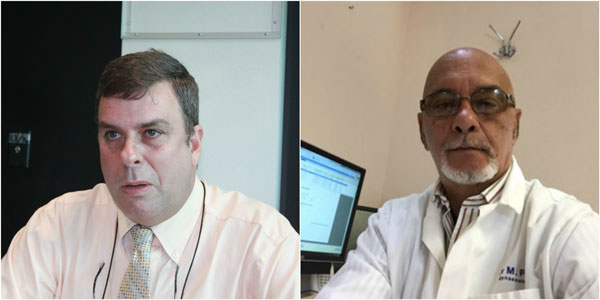NEW YORK/ PHILIPSBURG:--- I begin with gratitude to the Baku Initiative Group for this opportunity on behalf of the One St. Martin Association, also known as One SXM, representing the people in the colonized territories on St. Martin, a 37-square-mile Caribbean island colonized by France (Saint Martin) and the Netherlands (Sint Maarten).
The question before us today is whether we, the people who live in colonized territories, can envision a “shared future with our colonizers,” in the spirit of decolonization in the post-Bougival Accord era.
One SXM solemnly proclaims that the Bougival Accord is just another tool used by a colonizer to continue the dominance over colonized people and that it undercuts the United Nations’ pledge to speedily and unconditionally “end colonialism in all its forms and manifestations.” In fact, the language used by France, purporting to build a “shared future” for the Kanaki people, is the same language used by the Dutch when peddling their brand of colonialism on our islands in the Caribbean Sea.
While we in St. Martin—predominantly people of African descent—are historically and culturally one people, we are pressed to “envision a shared future” within France and the Netherlands in a twisted form of Stockholm Syndrome. Contrastingly, the French and Dutch peoples, who are more culturally and historically aligned with each other than with the peoples in the Caribbean, are not pursuing a “shared future.” They are French and Dutch, and they freely collaborate within the European Union as sovereign peoples defending their respective interests.
The St. Martin people also passionately yearn for our freedom and aspire to end colonialism in all its manifestations on our island. Thus, we ask the United Nations, in its mindfulness of the fundamental rights of the peoples of the world—in nations large and small—to justly respect its own principles of equal rights, self-determination, and fundamental freedoms of all peoples and recognize the dignity and worth of the St. Martin people.
Like the United Nations members, we in One SXM are convinced that “the continued existence of colonialism prevents the development of international economic co-operation, impedes the social, cultural and economic development of dependent peoples, and militates against the United Nations ideal of universal peace.”
The legal, political, and financial imbalances inherent in the colonial structures keep our people in a dependent state, and the elected leaders are dissuaded from speaking out against these injustices, further eroding confidence in our elected leaders and the pursuit of veritable democracy.
Furthermore, there remains an outstanding, unequivocal commitment to the discontinuation of colonialism and the disbursement of reparations. The Netherlands and France created the legal, financial, and fiscal policies for the enslavement and trafficking of Africans and the continuation of colonialism in St. Martin. The St. Martin people feel justified in our request for reparatory justice for the crimes committed against us and our ancestors.
Because we have not yet attained our independence, we ask the Baku Initiative Group, the United Nations members, and all freedom-loving people to commit to the UN’s pledge to assist the people in the non-self-governing territories administered by the French and Dutch (St. Martin and Sint Maarten, respectively) in executing our inalienable right to complete our freedom by regaining our independence.
As we approach the second half of the Fourth International Decade for the Eradication of Colonialism, we call on the United Nations to further intensify all efforts to implement the plan of action as set forth in the Second Decade and to ensure that this decade is indeed the last decade of colonization. As part of this process, we respectfully ask that you refine the language regarding self-determination under Resolution 1541 and revise the list of non-self-governing territories to accurately reflect the reality of our people living under colonialism. As with the refusal to formally and appropriately label the genocide of the Palestinian people, the refusal to duly call out colonization only gives the colonial criminals legal cover to continue their crimes.
Furthermore, the St. Martin people continue to be involuntarily implicated in actions of the colonizing states, such as engagement in war and other atrocities. Given the past actions of the Dutch and French states being our greatest teachers, One SXM further requests assistance with drafting, monitoring, and implementing free and fair referendums on the matter of independence in our territories within a reasonable timeframe.
Failure to render this justice to the St. Martin people is anti-humanity and a signal that the humanity of colonized peoples is of less value than that of their colonizers. The terminology may be obscure, but the practice of colonialism is clear, and if not in this forum, where else do the colonized people stand a chance to remedy this wrong? Certainly not in the reporting by the European administrations, which have avoided or ignored this requirement over time, nor in the colonized states.
Even after political independence, today, France employs colonial structures to continue the exploitation of people on the African continent. Given the aforementioned, our assessment is that the Bougival Accord cannot be considered a pathway to decolonization. Rather, it is a tool for continued colonization, just as the Dutch Kingdom Charter maintains colonization on our island by upholding colonial structures, maintaining military presence, and controlling our maritime space.
In closing, until the notion of Western and European supremacy is utterly destroyed, world peace will remain a fleeting illusion.
 PHILIPSBURG:--- St. Maarten’s healthcare and social insurance system is on life support, gasping under the weight of a predictable and preventable crisis. For nearly a decade, a chorus of warnings from financial watchdogs, internal experts, and supervisory boards has been met with a deafening silence from successive governments. This is not a story of an unforeseen disaster; it is a chronicle of gross negligence, political inaction, and a staggering betrayal of public trust.
PHILIPSBURG:--- St. Maarten’s healthcare and social insurance system is on life support, gasping under the weight of a predictable and preventable crisis. For nearly a decade, a chorus of warnings from financial watchdogs, internal experts, and supervisory boards has been met with a deafening silence from successive governments. This is not a story of an unforeseen disaster; it is a chronicle of gross negligence, political inaction, and a staggering betrayal of public trust. This crisis is compounded by a demographic reality that any competent administration should have foreseen. The average age of an SZV beneficiary has climbed from 38 in 2014 to 45 in 2022. It costs nearly four times as much to insure a person over 60 as it does someone younger. Instead of planning for this predictable shift, the government watched as the financial pressures mounted, choosing to do nothing.
This crisis is compounded by a demographic reality that any competent administration should have foreseen. The average age of an SZV beneficiary has climbed from 38 in 2014 to 45 in 2022. It costs nearly four times as much to insure a person over 60 as it does someone younger. Instead of planning for this predictable shift, the government watched as the financial pressures mounted, choosing to do nothing. PHILIPSBURG:--- A financial catastrophe is not just brewing in St. Maarten; it has been announced, documented, and repeatedly ignored. For years, the leadership at Social & Health Insurances (SZV) has sounded the alarm, providing clear data and desperate warnings about an impending collapse of the nation's health and social insurance system. Yet, these cries for urgent action have fallen on deaf ears within the government, pushing the country ever closer to a crisis that will affect every single resident.
PHILIPSBURG:--- A financial catastrophe is not just brewing in St. Maarten; it has been announced, documented, and repeatedly ignored. For years, the leadership at Social & Health Insurances (SZV) has sounded the alarm, providing clear data and desperate warnings about an impending collapse of the nation's health and social insurance system. Yet, these cries for urgent action have fallen on deaf ears within the government, pushing the country ever closer to a crisis that will affect every single resident. PHILIPSBURG:--- The St. Maarten Small Properties Association (SMSPA) proudly celebrates World Tourism Day and Caribbean Tourism Day on September 27 2025, guided by the global theme “Tourism and Sustainable Transformation” and the Caribbean Tourism Organization’s call “Caribbean Resilience: Crafting Tomorrow’s Tourism.” At a time when headlines speak of tourism booms, numbers, and arrivals, SMSPA reminds the region and the world: tourism is not measured by planes and ships alone, but by how deeply it sustains local people, families, and communities. In this moment of reflection, SMSPA calls on all who live off tourism — from ministers and policymakers to private stakeholders and international partners — to remember that without respect for human connections, the very pillars of our tourism are weakened. “Economically, our strongest pillars are stay-over tourism, loyal repeat guests, consistent year-round occupancy, and the fact that every dollar spent stays with us in St.Maarten- circulating through families, employees, and local businesses. After every disaster, it is people who stand first, not machines. If human resilience is ignored, transformation will ring hollow,” stated Ms.Nzinga Lake, President of SMSPA. “We are the original Airbnb,” long before digital platforms and algorithms, St. Martin’s families built hospitality from the ground up. Taxi drivers greeted visitors, grandmothers prepared meals, and homes became guesthouses.
PHILIPSBURG:--- The St. Maarten Small Properties Association (SMSPA) proudly celebrates World Tourism Day and Caribbean Tourism Day on September 27 2025, guided by the global theme “Tourism and Sustainable Transformation” and the Caribbean Tourism Organization’s call “Caribbean Resilience: Crafting Tomorrow’s Tourism.” At a time when headlines speak of tourism booms, numbers, and arrivals, SMSPA reminds the region and the world: tourism is not measured by planes and ships alone, but by how deeply it sustains local people, families, and communities. In this moment of reflection, SMSPA calls on all who live off tourism — from ministers and policymakers to private stakeholders and international partners — to remember that without respect for human connections, the very pillars of our tourism are weakened. “Economically, our strongest pillars are stay-over tourism, loyal repeat guests, consistent year-round occupancy, and the fact that every dollar spent stays with us in St.Maarten- circulating through families, employees, and local businesses. After every disaster, it is people who stand first, not machines. If human resilience is ignored, transformation will ring hollow,” stated Ms.Nzinga Lake, President of SMSPA. “We are the original Airbnb,” long before digital platforms and algorithms, St. Martin’s families built hospitality from the ground up. Taxi drivers greeted visitors, grandmothers prepared meals, and homes became guesthouses.